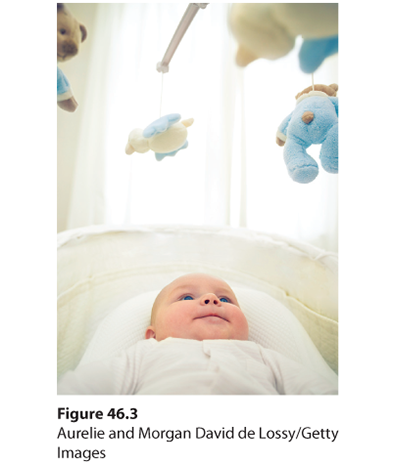Brain Maturation and Infant Memory
Can you recall your third birthday party? Studies suggest that we consciously recall little from before age 4. Mice and monkeys also forget their early life, as rapid neuron growth disrupts the circuits that stored old memories (Akers et al., 2014). But as children mature, this infantile amnesia wanes, and they become increasingly capable of remembering experiences, even for a year or more (Bauer & Larkina, 2014; Morris et al., 2010). The brain areas underlying memory, such as the hippocampus and frontal lobes, continue to mature during and after adolescence (Luby et al., 2016; Murty et al., 2016).
Despite consciously recalling little from our early years, our brain was processing and storing information. While finishing her doctoral work in psychology, Carolyn Rovee-Collier observed nonverbal infant memory in action. Her colicky 2-month-old, Benjamin, could be calmed by moving a crib mobile. Weary of hitting the mobile, she strung a cloth ribbon connecting the mobile to Benjamin’s foot. Soon, he was kicking his foot to move the mobile. Thinking about her unintended home experiment, Rovee-Collier realized that, contrary to popular opinion in the 1960s, babies can learn. To know for sure that her son wasn’t just a whiz kid, she repeated the experiment with other infants (Rovee-Collier, 1989, 1999). Sure enough, they, too, soon kicked more when hitched to a mobile, both on the day of the experiment and the day after. If, however, she hitched them to a different mobile the next day, the infants showed no learning, indicating that they remembered the original mobile and recognized the difference. Moreover, when tethered to the familiar mobile a month later, they remembered the association and again began kicking (Figure 46.3).

Figure 46.3 Infant at work
Babies only 3 months old learned that kicking moves a mobile, and they retained that learning for a month (Rovee-Collier, 1989, 1997).
Traces of forgotten childhood languages may also persist. One study tested English-speaking British adults who had no conscious memory of the Hindi or Zulu they had spoken as children. Yet, up to age 40, they could relearn subtle sound contrasts in these languages that other English speakers could not learn (Bowers et al., 2009). Chinese adoptees living in Canada since age 1 process Chinese sounds as do native speakers, even if they have no conscious recollection of Chinese words (Pierce et al., 2014). Again, our two-track mind is at work: What the conscious mind does not know and cannot express in words, the nervous system and unconscious mind somehow remember.